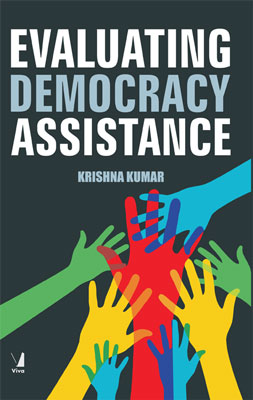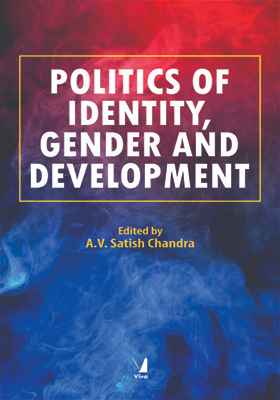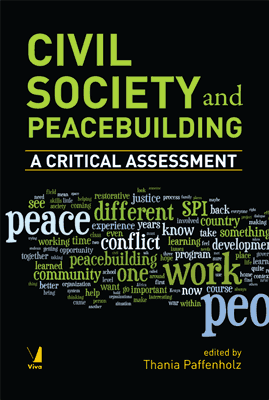Evaluating Democracy Assistance
Evaluating Democracy Assistance
₹895.50 ₹995.00 Save: ₹99.50 (10%)
Go to cartISBN: 9788130928883
Bind: Hardbound
Year: 2015
Pages: 256
Size: 152 x 228 mm
Publisher: Lynne Rienner Publishers, Inc.
Published in India by: Viva Books
Exclusive Distributors: Viva Books
Sales Territory: India, Nepal, Pakistan, Bangladesh, Sri Lanka
Reviews:
“The most probing, comprehensive study to date of the vexing challenge of evaluating democracy assistance programs. Kumar moves skillfully from a full recognition of the myriad pitfalls and dilemmas in this domain to a rich set of constructive ideas and recommendations."
—Thomas Carothers
Carnegie Endowment for International Peace
“Krishna Kumar's book fills a serious gap in the literature on evaluating the democracy promotion programs that have proliferated in the donor community."
—Harry Blair
Yale University
“Three things set this book apart from all the skepticism and fluff out there. First, it is on the cutting edge of evaluating democracy assistance, showing that it can be done and how to do it. Second, it goes beyond tools and methods, which are useful but not enough, to show that evaluation is about strategic thinking and evidence-informed action. Third, the author knows what he's talking about, drawing on his vast experience and deep knowledge to illustrate the guidance offered. In brief; this book integrates theory and practice on a critical issue of global importance: strengthening democratic institutions."
—Michael Quinn Patton
Author of Developmental Evaluation: Applying Complexity Concepts to Enhance Innovation and Use
“Timely and important.. .. Dr. Kumar's clear and thoughtful explanations of how monitoring and evaluation practices can be applied to the democracy and governance sector are an invaluable resource."
—Lorne W. Craner
lnternational Republican Institute
“An insightful and informed review, grounded in real-world experience, of how to evaluate the complexities of democracy support programs overseas."
—Kenneth Wollack
National Democratic Institute
Description:
With the international community providing billions of dollars each year to promote democratic institutions/cultures in transitional and developing countries, rigorous evaluations have become essential for determining the effectiveness, as well as the future direction, of democracy assistance programs. Krishna Kumar provides a unique, practical guide to the on-the-ground tasks of evaluating and monitoring these programs-from planning to implementation to preparing and presenting evaluation reports. Kumar assesses virtually all of the evaluation and monitoring approaches currently in play, pointing out the strengths and weaknesses of each and suggesting alternative approaches where appropriate. Packed with valuable insights, this book will serve as an essential tool for those who are involved in democracy assistance programming and evaluation, those who fund it, and those who simply want to learn more about it.
Contents:
Chapter 1: Why This Book”
Chapter 2: The Why and What of Evaluating Democracy Assistance • Why Democracy Evaluations” • The Meaning of Evaluation • Types of Democracy Evaluations • Evaluation Modalities • Obstacles to Evaluating Democracy Interventions
Chapter 3: Democracy Indicators: Their Use and Misuse in Evaluations • Micro-Level Indicators • Macro-Level Indices and Evaluations • Meso-Level Indices • Use of Meso-Level Indices in Albania • Disaggregating Macro-Level Indices • Conclusion
Chapter 4: Designing Realistic Monitoring Systems • The Meaning of Monitoring • Guiding Principles • Designing a Monitoring System • Operating a Monitoring System • Collaborative Critical Reflections
Chapter 5: Planning and Managing Evaluations • The Manager's Role During the Planning Phase • The Manager's Role During Implementation • The Manager's Role During Review and Follow-Up
Chapter 6: Experimental and Quasi-Experimental Designs • The Logic Behind Experimental and Quasi-Experimental Designs • Different Designs • Methodological and Practical Obstacles • The International Republican Institute's Experience • The National Democratic Institute's Experience • Conclusion
Chapter 7: Nonexperimental Designs • Pre- and Postdesigns • Cross-Sectional Design • Case Study Evaluation Designs • Steps to Improve Methodological Rigor
Chapter 8: Methods for Data Collection • Quantitative and Qualitative Methods • Sample Surveys and Censuses • Structured Direct Observation • Secondary Analysis of Data • Document Reviews • Key Informant Interviews • Focus Group Discussions • Group Interviews • Multimethod Approach
Chapter 9: Communicating Findings and Recommendations • Guiding Principles for Effective Communication • Critical Elements of Evaluation Reports • Written Products • Verbal Communication
Chapter 10: Concluding Observations
Appendix 1: Acronyms • Appendix 2: Glossary of Evaluation Terms • Appendix 3: A Note on Democracy Assistance Programs • References • Index
About the Author:
Krishna Kumar is senior evaluation adviser in the Office of Foreign Assistance Resources, US Department of State. He has been engaged in development and democracy assistance programming for the past three decades and has designed, managed, and conducted evaluations in Africa, Asia, Europe, and Latin America. His recent publications include Promoting Independent Media: Strategies for Democracy Assistance and the coedited Promoting Democracy in Postconflict Societies.







